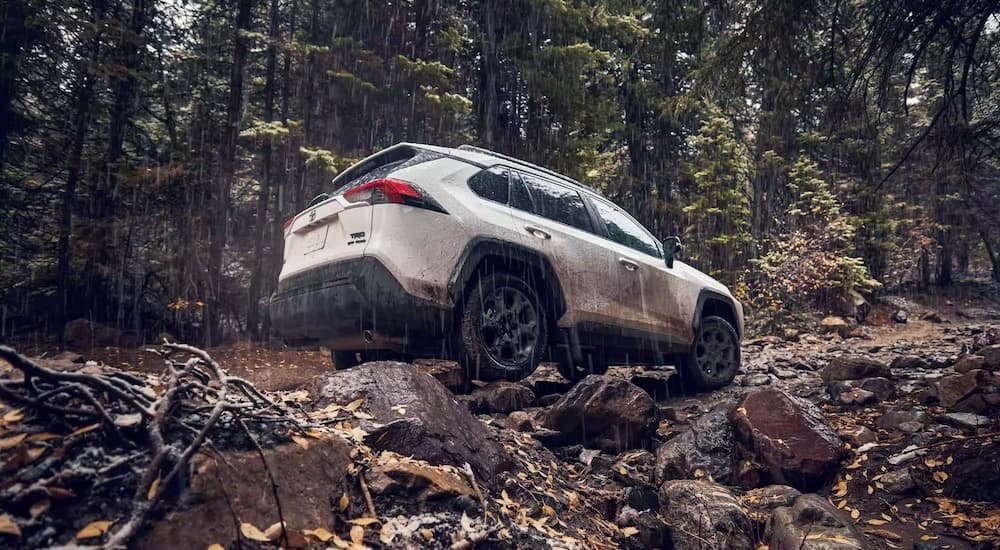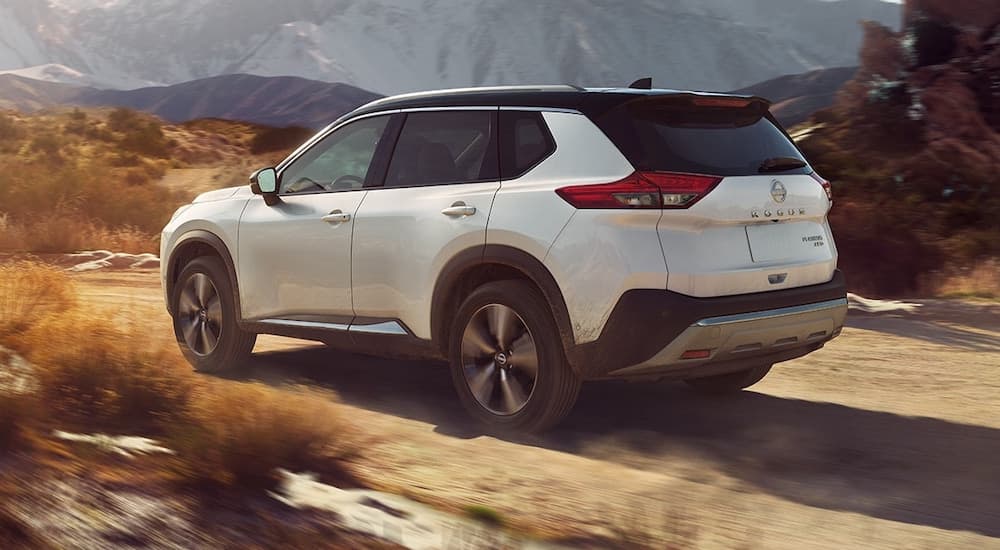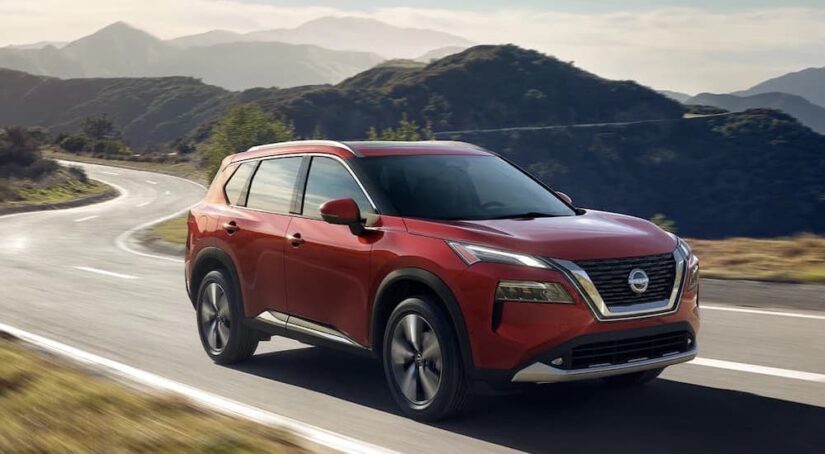If you’re shopping for a compact SUV with great horsepower, solid fuel economy, and some impressive towing abilities, then there’s a good chance you’ve narrowed your choices down to the 2023 Nissan Rogue vs 2023 Toyota RAV4. Both offer smooth handling and a lot of storage space and are excellent road trip or adventure vehicles. Of course, you’ll be putting these SUVs through their paces, and caring for a vehicle can be expensive. Not everyone budgets for repairs and parts replacements when they calculate out their annual or monthly vehicle expenses. The good news is that each of these vehicles comes with some generous warranties to cover repairs under certain circumstances.
Many drivers don’t ever look up the warranties on their vehicles until a problem comes up. At that point, you’re stuck having to pay whatever your warranties don’t cover. It’s a good idea to know exactly what is covered and when—that way, you don’t wind up paying for something you shouldn’t, or you won’t fall short on coverage when you need it. If you’re struggling to make a final call between the 2023 Nissan Rogue and the 2023 Toyota RAV4, then understanding their warranties may help you make a decision. Here’s a closer look…
Basic Coverage
Let’s begin with basic coverage. This is going to cover repairs needed as a result of workmanship issues. So, basically, if the problem originated in the factory—instead of as a result of normal wear and tear or an accident—you’re covered. This warranty lasts for 36,000 miles or 36 months on both the RAV4 and the Rogue.
It’s a good idea to get a sense of what constitutes “normal wear and tear.” This usually refers to some dings, dents, and minor scratches. If you’ve ever turned a lease in, the items the dealership considered to be normal wear and tear will likely apply to your warranty—but check first.
There is a list of exclusions or otherwise items that are not covered. For the Rogue, what’s not covered includes issues that result from, 1) Not using the vehicle according to the rules set forth in the owner’s manual, 2) Using the vehicle in a way that it’s not intended, like towing beyond its capability or using it for competitive driving, and 3) Damage caused by a pressure washer at a car wash. These are just a few of the conditions under which the basic coverage would not kick in for the Rogue. Check the full warranty packet for details.
For the RAV4, conditions under which the warranty would not be effective are similar, but there are some subtle differences. The RAV4, for example, has a warranty that will be ineffective if the damage is due to, 1) Neglect or improper maintenance, 2) Using fluids or fuel not approved of in the owner’s manual, or 3) Airborne chemicals like “tree sap, road debris, rail dust, hail, floods, wind storms” and other weather factors. While these specifications might seem subtle, they’ll matter when it’s time to get repairs done.

Emissions Performance
Emissions performance essentially refers to your vehicle’s ability to pass a smog test. If your vehicle doesn’t pass a smog test, you won’t be able to renew your registration. However, in some cases, this failure might be due to factory defects. In that case, your warranty will cover you.
For both the 2023 Rogue and RAV4, you get a federal emissions warranty that lasts 24 months or 24,000 miles. Under warranty, the manufacturer will pay for any repairs necessary to bring your vehicle back up to federal emissions standards.
Then, there’s the California emissions performance warranty. It’s slightly different because California has different standards for its vehicles. For each vehicle, the California performance emissions policy is 84 months or 70,000 miles.
Powertrain Coverage
The powertrain is going to be anything involved in making your vehicle move. This includes the engine, the transmission, and the transaxle. Both vehicles get a powertrain warranty that lasts for 60 months or 60,000 miles.
Seatbelt Coverage
The seatbelt coverage differs a bit between these two vehicles. While the Nissan Rogue has a separate warranty for its seatbelts, lasting for 120 months or unlimited mileage, the seatbelt coverage for the RAV4 falls under the restraints systems warranty coverage. For the RAV4, coverage lasts 60 months or 60,000 miles.
Take note that the length of coverage for the seatbelt in the Rogue is twice as long as that for the RAV4. Additionally, there is a mileage limit for seatbelt coverage on the RAV4, while there is no such mileage limit for that on the Rogue.
Corrosion & Rust
Both vehicles get a generous corrosion and rust warranty lasting for 60 months and unlimited mileage. For the Rogue, this coverage extends to any “body sheet metal panel supplied by Nissan found to have developed perforation (rust-through) due to corrosion.” For each vehicle, coverage won’t apply if rust develops due to failure to use the vehicle according to the owner’s manual.

Roadside Assistance
This is one of the largest differences in coverage between these vehicles. In the event that your vehicle becomes inoperable due to a mechanical issue, dead battery, accident, flat tire, or lock-out, you will have access to 24/7 roadside assistance 365 days a year. However, on the Rogue, this lasts for 36 months or 36,000 miles. On the RAV4, this only lasts for two years or 25,000 miles. So you get a full one year and 11,000 miles of coverage more on the Rogue.
Under Warranty & Overjoyed
Everyone knows of that moment of panic when you realize something is wrong with your car. The first thing you wonder is, “How much is this going to cost me?” and the next thing you wonder is, “When will I be able to use my car again?” When you pay for your own repairs, the process can be costly and lengthy; you’ll find yourself calling different auto body shops to get quotes, weeding through places that over-quote, and potentially taking your vehicle somewhere that does more harm than good. This process can tie up your vehicle for weeks and put a big dent in your bank account.
Luckily, with these new vehicle warranties on the 2023 Nissan Rogue and Toyota RAV4, you can feel confident that if an issue comes up that originated during the manufacturing process, you will not be financially liable. That means you can take it to your nearest Nissan or Toyota dealer, skipping the process of researching body shops and getting quotes, and you’ll rest easy knowing you won’t pay a dime—so long as you meet the conditions outlined in your warranty.
This might be a lot to consume—so, to break down the major differences worth noting in the two warranties, the seatbelt warranty is twice as long on the Rogue and lasts for unlimited mileage; the emergency roadside assistance lasts for one year or 11,000 miles longer on the Rogue; and there are slight differences in the conditions that would make your warranty ineffective for basic coverage, favoring the Rogue.
Ultimately, the 2023 Nissan Rogue has a slightly better warranty program than the 2023 Toyota RAV4. If you are concerned about costs relating to repairs and parts, the Rogue might be your better option.



